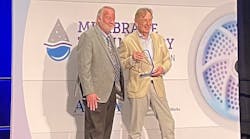The U.S. Environmental Protection Agency (EPA) and the U.S. Department of Justice (DOJ) announced that Trident Seafoods Corp., one of the world’s largest seafood processors, has agreed to pay a $2.5 million civil penalty and invest millions in seafood processing waste controls to settle alleged violations of the Clean Water Act (CWA).
Unauthorized discharges of seafood processing waste lead to large seafood waste piles on the seafloor, creating anoxic or oxygen-depleted conditions that result in unsuitable habitats for fish and other living organisms.
“Today’s settlement signals an important change in how seafood processing is managed in Alaska,” said Cynthia Giles, assistant administrator for EPA’s Office of Enforcement and Compliance Assurance. “Trident’s investment in fishmeal facilities and commitment to improving its waste management practices will help protect our nation’s waters and set the standard for Alaska’s seafood processing industry.”
The agreement requires Trident to invest an estimated $30 million to $40 million, and potentially more, in source control and waste pile remediation measures. The source control measures include building a fishmeal plant in Naknek, Ala., that will have the capacity to handle at least 30 million lb of seafood processing waste annually, taking in both its own fish waste and potentially that of other local processors.
Trident has also agreed to reduce the amount of seafood processing waste discharged from the Akutan, Cordova, St. Paul and Ketchikan, Ala., facilities and monitor the amount of seafood processing waste discharged into Starrigavan Bay in Sitka, Ala. The actions taken will reduce Trident’s fish processing discharges by a total of more than 105 million lb annually.
The company has also agreed to remediation measures including studying seafloor waste piles at Trident’s facilities in Akutan, Ketchikan and Cordova. Based on the results of these studies, Trident will remove or partially remediate the piles. One seafood processing waste pile in Akutan Harbor is currently estimated to be more than 50 acres in size.
Source: EPA

